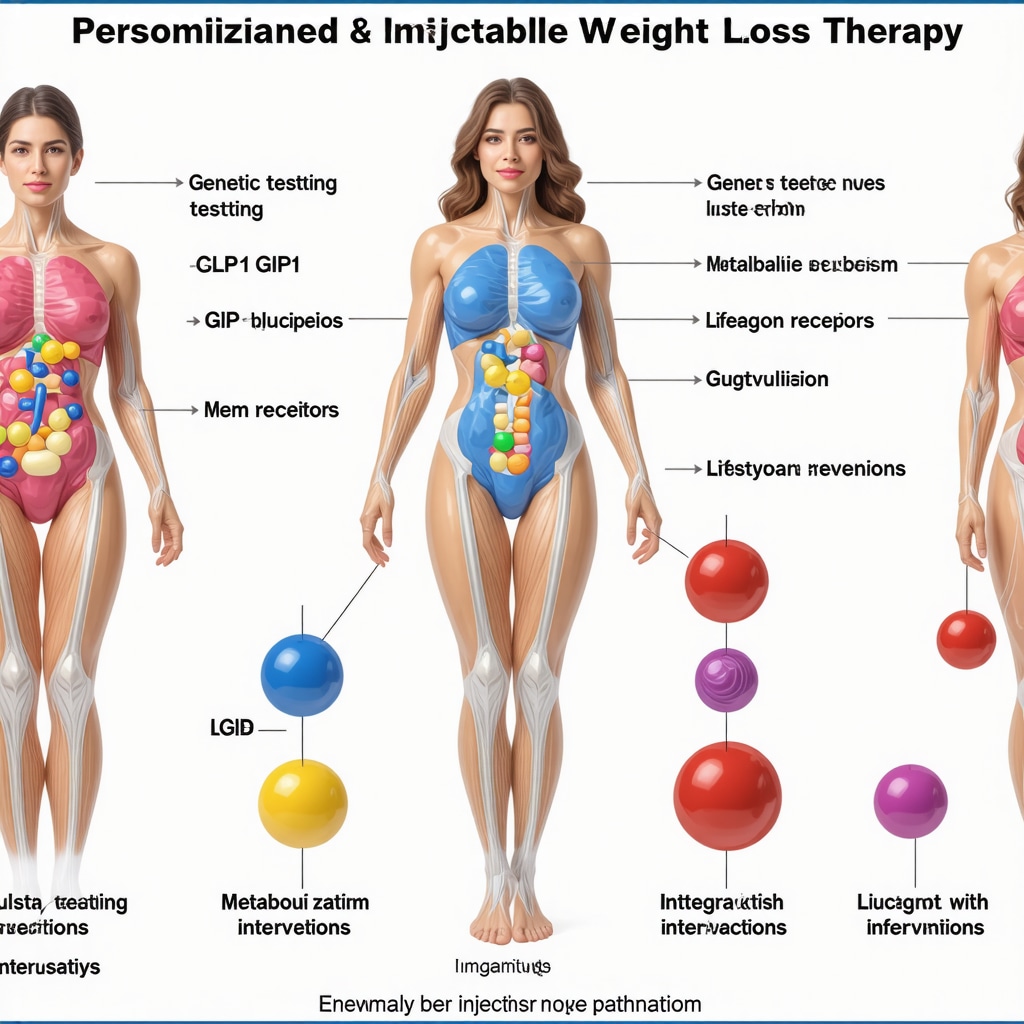Injectables: The New Frontier in the Weight Loss Saga
Picture this: a tiny injection, barely the size of a pinprick, promising to help you shed stubborn pounds without the ancient ritual of starvation diets or punishing gym hours. Sounds like science fiction? Not anymore. Weight loss injections have surged into the spotlight, offering a compelling shortcut for many. But with great power comes great responsibility—and a slew of questions. How do you choose the right injectable option that’s both safe and effective? Let’s dive into this fascinating, and sometimes bewildering, landscape.
Why Are Injectable Weight Loss Medications Suddenly the Talk of the Town?
Injectables like GLP-1 receptor agonists, including semaglutide and tirzepatide, have transformed from obscure diabetes treatments to weight loss game-changers. These medications work by mimicking hormones that regulate appetite and blood sugar, helping to curb cravings and boost fat metabolism. The FDA’s recent approvals have only fueled the frenzy, but it’s crucial to remember that these aren’t magic bullets—they’re powerful tools best wielded with expert guidance.
Is the Needle Mightier Than the Spoon? A Columnist’s Question
Can a weekly injection truly outperform months of dieting and exercise? The answer is nuanced. Clinical studies, such as those published in The New England Journal of Medicine, reveal impressive results, but the journey doesn’t end with the shot. Sustainable weight loss demands lifestyle changes, medical supervision, and patience. The injection is a catalyst—not a cure-all.
Safety First: Navigating the Injectable Jungle
With the surge in injectable options, safety has become a hot topic. Side effects like nausea, gastrointestinal discomfort, and injection site reactions are common but usually manageable. However, the importance of sourcing these medications legally and using them under a doctor’s supervision cannot be overstated. Rogue products and improper use can lead to serious health risks. For those keen on exploring these therapies, consulting a healthcare professional to create a personalized plan is the smartest move. Check out safe usage tips for 2025 to deepen your understanding.
Injectables and You: Tailoring the Perfect Plan
One size doesn’t fit all in weight loss injections. Factors like medical history, weight loss goals, and lifestyle preferences shape the best choice. Doctor-led programs, which blend injectable therapy with nutritional counseling and exercise plans, have shown the highest success rates. Curious about how to qualify for these advanced treatments? You might find this step-by-step guide enlightening.
So, dear reader, are you ready to explore the needle’s potential as an ally in your weight loss journey? Share your thoughts or experiences below—let’s get the conversation going!
Understanding the Psychological Impact of Injectable Weight Loss Therapies
While the physiological benefits of injectables like semaglutide and tirzepatide are well-documented, their psychological effects deserve equal attention. Patients often report a renewed sense of control and motivation when they see measurable results facilitated by these medications. However, it’s essential to recognize that injectable therapies may also bring emotional challenges, such as dependency fears or anxiety about side effects. Integrating psychological support within doctor-led weight loss plans can enhance long-term success and patient satisfaction.
How Are Emerging Injectable Therapies Shaping the Future of Obesity Treatment?
Beyond GLP-1 receptor agonists, research is advancing rapidly on dual and triple agonists that target multiple metabolic pathways simultaneously. These innovative therapies aim to amplify fat loss, improve glycemic control, and reduce cardiovascular risks more effectively than current options. As highlighted in a recent review by the National Institutes of Health, these next-generation injectables could revolutionize obesity management, though accessibility and cost remain challenges to address.
Can Personalized Injectable Weight Loss Plans Outperform Standard Protocols?
Personalization is the cornerstone of modern medicine, and weight loss is no exception. Tailoring injectable regimens based on genetic markers, metabolic profiles, and lifestyle factors promises to optimize efficacy and minimize side effects. This approach contrasts with one-size-fits-all treatments, potentially transforming patient adherence and outcomes. Exploring doctor-prescribed weight loss plans that incorporate personalized injectable therapies, such as those detailed in this comprehensive guide, can provide invaluable insights for patients and practitioners alike.
Ensuring Safe and Legal Access to Weight Loss Injections in 2025
As demand for injectable weight loss medications surges, so does the risk of counterfeit or unregulated products entering the market. Legal acquisition through telemedicine and certified healthcare providers ensures safety, efficacy, and proper monitoring. Telemedicine platforms are particularly instrumental in expanding access while maintaining medical oversight. For those interested, this resource elucidates how telemedicine is reshaping patient access to prescription weight loss therapies.
We invite you to share your experiences or questions about injectable weight loss medications in the comments below. Engaging in a dialogue helps build community knowledge and supports others navigating their weight loss journeys.

Decoding the Intricacies of Personalized Injectable Weight Loss Regimens: Beyond One-Size-Fits-All
In the evolving landscape of obesity management, personalization is not merely a trend but an imperative. Leveraging advanced diagnostics, clinicians now tailor injectable weight loss therapies to individual genetic polymorphisms, hormone receptor sensitivities, and metabolic phenotypes. This bespoke approach enhances therapeutic precision, optimizing efficacy while mitigating adverse effects. For example, pharmacogenomic profiling can predict responsiveness to GLP-1 receptor agonists, enabling clinicians to select candidates most likely to benefit from semaglutide or tirzepatide. Such stratification not only maximizes weight reduction outcomes but also promotes patient adherence by aligning treatment with individual biology and lifestyle nuances.
Moreover, integration of continuous glucose monitoring and digital health tools facilitates dynamic adjustments to dosing schedules, providing a responsive framework that adapts in real-time to metabolic fluctuations. This synergy of molecular medicine and technology exemplifies the frontier of weight loss injectables, transforming them from static interventions into adaptive therapies.
What Are the Challenges and Solutions in Implementing Genotype-Guided Injectable Weight Loss Therapies?
While the promise of genotype-guided injectable regimens is compelling, clinical translation faces hurdles including limited availability of comprehensive genetic testing, cost barriers, and the necessity for clinician expertise in interpreting complex molecular data. Additionally, ethical considerations arise regarding data privacy and equitable access. Addressing these challenges involves multidisciplinary collaboration to develop standardized protocols, enhance patient education, and integrate genetic counseling within obesity treatment frameworks. Pilot programs demonstrating cost-effectiveness and patient outcome improvement are crucial to justify broader implementation in healthcare systems.
Synergistic Innovations: Combining Injectable Therapies with Emerging Metabolic Modulators
Beyond the established GLP-1 receptor agonists, next-generation injectables are exploring combinatorial approaches that target multiple metabolic pathways simultaneously. For instance, dual and triple agonists engaging GLP-1, GIP (glucose-dependent insulinotropic polypeptide), and glucagon receptors are under clinical evaluation. These multifaceted agents potentiate appetite suppression, enhance insulin sensitivity, and increase energy expenditure, culminating in superior weight loss and cardiometabolic benefits.
Complementing these pharmacological advances, adjunctive use of injectable peptides modulating brown adipose tissue activation and mitochondrial biogenesis offers a novel route to augment basal metabolic rate. Early-phase trials underscore their potential but also highlight the necessity for rigorous safety assessments given the complex systemic effects.
Integrating Injectable Weight Loss Therapies into Multimodal Treatment Paradigms
Optimal outcomes emerge when injectables are embedded within comprehensive care models encompassing nutritional science, behavioral therapy, and physical activity regimens. Personalized counseling addressing psychological dimensions—such as managing treatment-related anxieties and fostering motivation—amplifies the benefits of pharmacotherapy. Digital platforms facilitating remote monitoring and patient engagement further enhance adherence and allow timely intervention adjustments.
For healthcare providers and patients aiming to navigate this complex therapeutic terrain, continuous education and open communication are indispensable. Discover more about crafting individualized, evidence-based injectable weight loss plans by exploring this comprehensive guide. Engage with experts and peers to deepen your understanding and optimize your weight loss journey.

The Frontier of Personalized Medicine: Tailoring Injectable Weight Loss for Optimal Results
In 2025, the paradigm of injectable weight loss therapies is shifting dramatically toward personalization, fueled by advances in genomics and metabolic profiling. This bespoke approach not only enhances efficacy but also minimizes adverse effects by aligning treatment regimens with an individual’s unique biological blueprint. By integrating data from pharmacogenomics, hormone receptor sensitivity assays, and continuous metabolic monitoring, clinicians can now fine-tune dosages and combinations of GLP-1 receptor agonists like semaglutide or tirzepatide to maximize patient outcomes.
Such precision medicine is revolutionizing obesity care, transforming static dosing into dynamic, adaptive protocols that respond to real-time physiological changes. Patients benefit from tailored interventions that address their specific metabolic hurdles, helping overcome the plateau phenomena often encountered in weight loss journeys.
How Do Genetic and Metabolic Markers Inform Injectable Weight Loss Strategies?
Genetic polymorphisms affecting GLP-1 receptor expression and insulin sensitivity are pivotal in predicting patient responsiveness to injectable therapies. For instance, individuals with certain variants demonstrate enhanced appetite suppression and improved glycemic control when treated with semaglutide, while others may respond better to combination therapies like tirzepatide that target multiple receptors. Metabolic markers, including basal metabolic rate and adipose tissue distribution profiles, further refine these predictions.
Despite these advances, challenges remain. Limited access to comprehensive genetic testing and the need for specialized clinician training in interpreting complex datasets pose barriers. However, multidisciplinary clinical teams and emerging decision-support software are bridging these gaps, enabling broader implementation of genotype-guided treatment plans that have shown promising results in recent clinical trials, as detailed in a peer-reviewed study by the Journal of Obesity and Metabolic Research.
Synergistic Combinations: Injectables Paired With Novel Metabolic Modulators
Cutting-edge research explores combining GLP-1 receptor agonists with emerging metabolic modulators that activate brown adipose tissue or enhance mitochondrial efficiency. These adjunctive therapies boost basal energy expenditure, complementing appetite-suppressing injectables to accelerate fat loss. Early-phase clinical data reveal encouraging cardiometabolic benefits, though these combinations require careful safety evaluations and personalized dosing to mitigate systemic effects.
Innovative protocols integrating these modalities within holistic care frameworks, including nutritional guidance and behavioral therapy, exemplify the future of obesity treatment. For those eager to explore such advanced options, the resource doctor-prescribed weight loss plans customized for you offers invaluable insights.
Addressing Safety and Accessibility in the Era of Personalized Injectable Therapies
As the complexity of injectable regimens increases, ensuring patient safety through vigilant monitoring and legal access pathways remains paramount. Telemedicine platforms play a critical role in bridging geographic and economic barriers, providing expert oversight and adherence support. Accessing FDA-approved medications through certified providers guarantees product authenticity and minimizes health risks associated with unregulated sources.
To navigate this evolving landscape safely, consult resources like safe usage tips for 2025 and engage with healthcare professionals who specialize in personalized obesity care.
What Are the Ethical and Practical Implications of Widespread Genetic Testing for Weight Loss Injectables?
Widespread adoption of genotype-guided injectable therapies raises important ethical questions regarding data privacy, equitable access, and potential discrimination. Ensuring informed consent and robust data protection is essential to maintain patient trust. Additionally, addressing disparities in genetic testing availability is crucial to prevent exacerbating healthcare inequalities.
Practical hurdles include integrating genetic data interpretation into busy clinical workflows and securing reimbursement for advanced diagnostics. Multistakeholder collaboration among clinicians, policymakers, and patient advocates is vital to develop standardized guidelines and foster equitable access.
As these complex considerations unfold, we invite readers to share their perspectives or experiences with personalized injectable weight loss treatments in the comments below. Your insights contribute to a richer discourse and help shape the future of obesity management.
For a comprehensive introduction on qualifying for prescription weight loss medications and beginning a personalized plan, visit how to qualify for prescription weight loss medications today.

Expert Insights & Advanced Considerations
Precision Medicine Elevates Injectable Weight Loss Efficacy
Injectable weight loss therapies are no longer uniform treatments but are evolving into tailored interventions. By integrating patient-specific genetic and metabolic markers, clinicians can predict responsiveness to agents like semaglutide or tirzepatide, optimizing outcomes and minimizing adverse effects. This paradigm shift exemplifies the move toward truly personalized obesity care.
Combining Metabolic Modulators Enhances Fat Loss Synergistically
Emerging protocols pairing GLP-1 receptor agonists with novel metabolic modulators—such as peptides activating brown adipose tissue or mitochondrial biogenesis—demonstrate promising enhancements in basal metabolic rate. These synergistic combinations represent a frontier in injectable therapies, offering multi-pronged approaches to obesity management that go beyond appetite suppression alone.
Telemedicine is a Critical Enabler of Safe, Accessible Injectable Therapy
Increased demand for injectable weight loss medications has raised concerns about accessibility and safety. Telemedicine platforms now play an indispensable role by providing patients with legal, supervised access to FDA-approved therapies, continuous monitoring, and personalized adjustments. This model mitigates risks linked to unregulated sources and ensures adherence to best practices.
Psychological Support is Integral to Sustained Injectable Weight Loss Success
While physiological benefits of injectables are well-documented, addressing emotional and behavioral aspects is essential. Integrating psychological counseling with medical treatment helps manage anxiety related to injections, fosters motivation, and supports adherence, ultimately enhancing the durability of weight loss results.
Ethical and Practical Challenges Surround Genotype-Guided Therapies
The expansion of genetic testing to guide injectable weight loss treatments raises complex issues including data privacy, equitable access, and clinical integration hurdles. Multidisciplinary collaboration and standardized guidelines are necessary to navigate these challenges responsibly while maximizing patient benefit.
Curated Expert Resources
- Journal of Obesity and Metabolic Research: A peer-reviewed source offering rigorous clinical trial analyses on pharmacogenomics and injectable therapies, indispensable for understanding genotype-guided treatment efficacy (link).
- FDA-Approved Weight Loss Treatments Explained: A comprehensive guide detailing current injectable medications, their mechanisms, benefits, and safety profiles, essential for clinicians and patients alike (FDA-approved injectable weight loss treatments benefits).
- Doctor-Prescribed Weight Loss Plans Customized for You: An authoritative resource emphasizing personalization strategies integrating injectable therapies within holistic plans (customized plans).
- Safe Usage Tips for Injectable Weight Loss in 2025: Critical advice on legal, safe acquisition and administration practices to mitigate risks associated with unregulated products (safe usage tips).
- Telemedicine Weight Loss Treatment Expands Access Nationwide: Insight into how telehealth platforms democratize access to injectable therapies while ensuring medical oversight (telemedicine access).
Final Expert Perspective
The trajectory of injectable weight loss therapies in 2025 and beyond is unmistakably toward personalization, safety, and integration within comprehensive care frameworks. Harnessing genetic insights and metabolic profiling allows clinicians to tailor treatments like semaglutide and tirzepatide precisely, while adjunctive metabolic modulators promise synergistic benefits. Telemedicine’s role in facilitating legal, supervised access ensures that these advances reach patients effectively and safely. Yet, the journey requires attentiveness to psychological support and ethical considerations surrounding genetic data. Embracing these multifaceted dimensions elevates injectable weight loss from a mere pharmacological intervention to a sophisticated, patient-centered strategy.
For those ready to explore or deepen their understanding of personalized injectable weight loss plans, consider reviewing how to qualify for prescription weight loss medications today and doctor-prescribed weight loss plans customized for you. Engage with healthcare professionals to craft a plan that aligns with your unique biology and lifestyle, and share your insights or questions to contribute to this evolving conversation.
